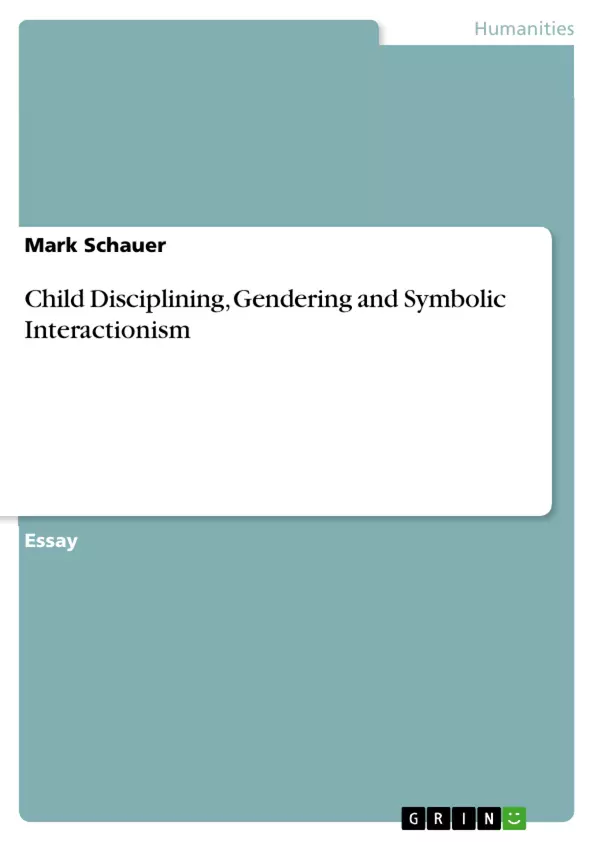The salient question for our society is, how can parents cope with this when stereotypical gendering is deeply inculcated into the broader society, and meets resistance even from those who intellectually know the benefits of breaking with a given mode of instruction, yet can’t or won’t break with the way they were socialized as children? And, more grippingly, what if this conflict is present within the home when parents disagree about the value of gender neutral upbringing and concomitant issues of discipline?
The daunting nature of changing the gendered norm is exemplified in the continued prevalence of corporal punishment in our society. Study after study finds that, “almost all children in the United States are spanked by their parents at some point in their lives.” (Sims 170) Though the number of parents who frequently use corporal punishment has diminished in previous decades, the decline is negligible relative to the evidence of its psychological harm on children, its contraindication for changing behavior, and its outlaw in schools and the like. More intriguingly, the use of corporal punishment has not declined in kind with its fall in intellectual support: in fact, it has remained constant. Though the approval rating of spanking declined from 94% in 1968 to 68% in 1994, fully 94% of parents surveyed in 1994 reported spanking their child at least once. (Walsh 82) This suggests that better than a quarter of the population has utilized a psychologically damaging and ineffective form of punishment on their child(ren) even though they are intellectually opposed to it. Additionally, a substantial plurality of both spankers and non-spankers consider the opinions of doctors and other experts on the subject more valuable than that of their parents and other relatives.
Table of Contents
- Child Discipline, Gendering, and Symbolic Interactionism
- Symbolic Interactionism and Gender Socialization
- Parents' Impact on Gender Socialization
- Corporal Punishment and Gendered Norms
- The Impact of Incompatible Discipline Styles
Objectives and Key Themes
This text aims to explore the influence of symbolic interactionism on children's gender socialization and its impact on parenting practices, particularly in the context of discipline. The key themes explored are:- The role of symbolic interactionism in shaping gender identities and behaviors.
- The impact of parental gender roles on children's socialization.
- The prevalence and consequences of corporal punishment.
- The challenges of achieving gender-neutral parenting in a traditionally gendered society.
- The impact of incompatible parenting styles on family dynamics and communication.
Chapter Summaries
Child Discipline, Gendering, and Symbolic Interactionism
This chapter introduces the concept of symbolic interactionism and its relevance to understanding gender socialization. It highlights how parents, often themselves socialized in traditional gender roles, unconsciously impart these norms onto their children.Symbolic Interactionism and Gender Socialization
This chapter delves deeper into symbolic interactionism, explaining how children learn about gender through interactions with others. It explores the social construction of gender and the influence of societal expectations on children's behavior.Parents' Impact on Gender Socialization
This chapter focuses on the specific role of parents in children's gender socialization. It discusses how mothers' interactions with boys and girls often differ, and how fathers may experience pressure to conform to traditional masculine ideals.Corporal Punishment and Gendered Norms
This chapter examines the prevalence and consequences of corporal punishment. It argues that the persistence of corporal punishment, despite its documented negative impacts, reflects the deep-seated influence of traditional gender roles and parenting practices.The Impact of Incompatible Discipline Styles
This chapter explores the challenges of navigating incompatible parenting styles, particularly in heterosexual couples. It highlights how conflicts over discipline can negatively impact family communication and children's perception of gender roles.Keywords
This text focuses on the core concepts of symbolic interactionism, gender socialization, parental influence, corporal punishment, and the impact of incompatible discipline styles on children's development and family dynamics. Key terms include gender identity, traditional gender roles, social constructionism, parenting practices, and inter-gender communication.Frequently Asked Questions
What is Symbolic Interactionism in the context of gendering?
It is a theory explaining how children learn gender roles through social interactions and the meanings they attach to parental behaviors and societal expectations.
Why does corporal punishment persist despite intellectual opposition?
Studies show that while approval of spanking has declined, many parents still use it because they were socialized that way or struggle to break with traditional gendered norms of discipline.
How do parental disagreements over discipline affect children?
Incompatible parenting styles can create conflict within the home and impact the child's perception of gender roles and family communication.
Is gender-neutral upbringing common in the US?
The text suggests it meets significant resistance because stereotypical gendering is deeply inculcated into broader society and traditional socialization patterns.
What is the impact of corporal punishment on child psychology?
Evidence suggests it is psychologically damaging, ineffective at changing long-term behavior, and often contraindicated for healthy development.
- Arbeit zitieren
- Mark Schauer (Autor:in), 2009, Child Disciplining, Gendering and Symbolic Interactionism, München, GRIN Verlag, https://www.grin.com/document/230277



